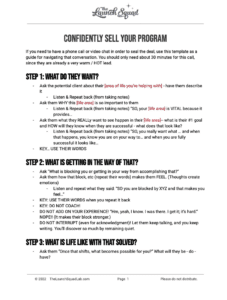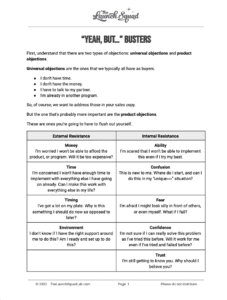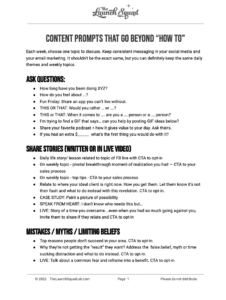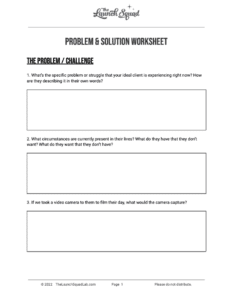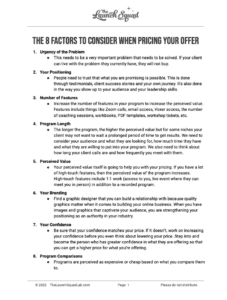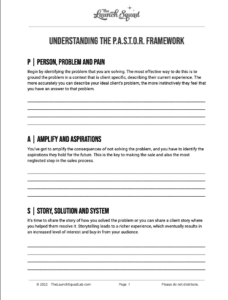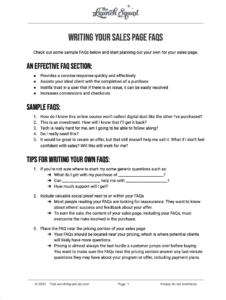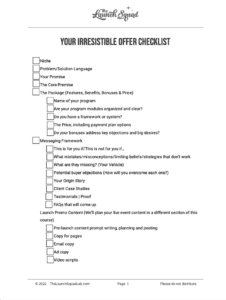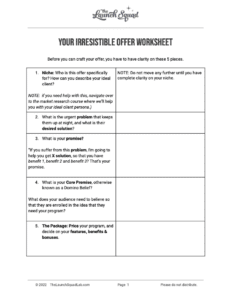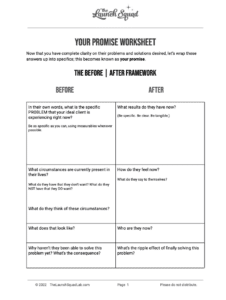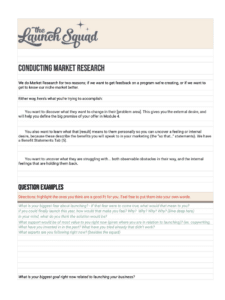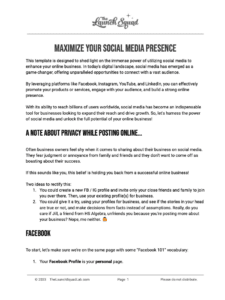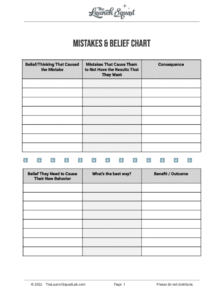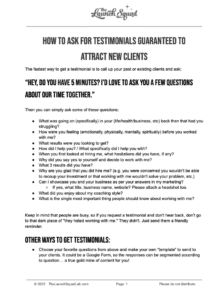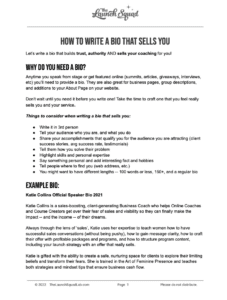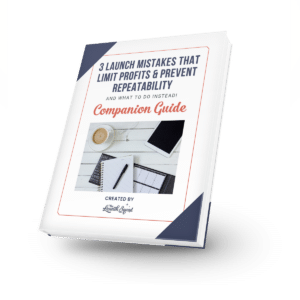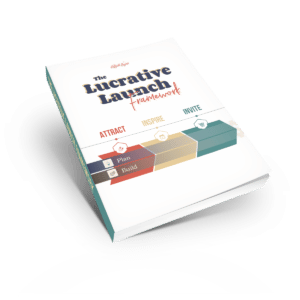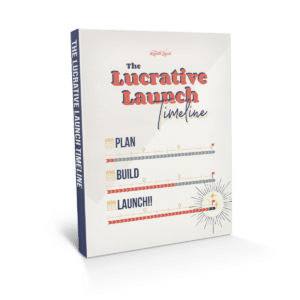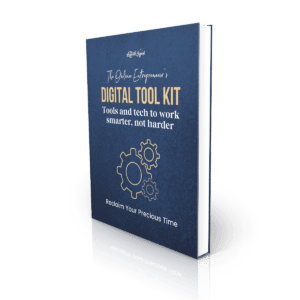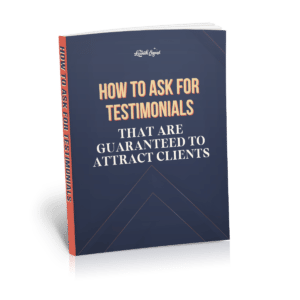Your time management efforts could just be a big waste of time if you’re creating a routine for the wrong Chronotype. What Chronotype are you and how does that affect how you manage your time? Today we’re talking with our very own Allison Miles and Ashleigh Doucet. Allison is our project manager and Ashleigh is our Social media manager and these wonderful women are sharing their tips and tools for getting $#!T done.
Jeffrey: Welcome to the light in your launch podcast today, we're talking about how you're wasting time in your business. Stay tuned.
Announcer: Hey, we're the Launch Squad and this is the Lighten Your Launch podcast. We teach coaches and course creators how to lighten their launches. We're bringing you all of the tips and strategies to take your launch from intimidating to money-making. In this podcast, we talk about everything; the sales, strategy, mindset, technical and spiritual aspects of running your best launch ever. So if you're feeling overwhelmed and unsure of the next right step, we're here to bring clarity, confidence, and excitement into your next launch. This is the Lighten Your Launch podcast.
Jeffrey: Welcome back to the show. I'm Jeffrey [inaudible]. And today I am talking with two very, very special ladies in our world. We are talking with Ashley Doucette and Alison miles, and they are part of our team. You have probably heard us talking about them before, and I'm really excited to welcome them to the podcast. Finally, uh, Alison, tell us a little bit about your background. We'll just go back and forth and, uh, tell us about your background and kind of what brought you into this world.
Allison: So I am currently the project manager for the launch squad and my background was mostly in the standard nine to five corporate world. Um, and I decided about two and a half years ago that I needed to have a fresh start and get out of that environment. Um, as most people that we work with have, have come to that conclusion, it's a structure that was no longer benefiting me personally or professionally. Um, and so I made the leap and just started my own, um, virtual assistant business. And Jeffrey was actually my very first client.
Jeffrey: Oh, uh, I wear that with a badge.
Allison: You should, it's not the badge of honor. Um, and yeah, two, two years later and here we are, and I have a handful of clients and I, I act in a kind of a combination of a project manager, um, executive assistant type role for them. And, um, it just keeps growing every day and, and it's been an amazing experience. Um, it grew into something that I didn't really see coming. It started as just a small little virtual assistant freelance business, and I just filed my own LLC a few weeks ago. So it's been very exciting. Um, but that's, that's my background and that's kind of what brought me here and just using all the skills I've developed over the last 10 years of being in the office environment and taking it virtual. And it's been, it's been quite the journey,
Jeffrey: Quite the journey I have experienced part of your Journey. There have been colorful, say the least
Allison: You've experienced all that highs and the lows. It's been good though. It's fun, right? Oh, it's been a blast. I would not trade it for anything. I mean, it can sound like a cliche getting to work from home, you know, literally work in your pajamas if you want to or not. You know, and, and I've discovered that some days I can get away with the pajama mode, but other days I'm like, Nope, you got to put yourself together. You got to put your face on, you gotta get in front of that work and get it done. And, um, but it's, it's so interesting how everybody operates differently and, and you just have to find your groove. I think that's the most important thing.
Jeffrey: I really appreciate that we only have to really get dressed from the waist up nowadays since everything's on
Allison: Very much. Yeah. It's like, okay, pajamas thanked us. We're good. You only see you only see the neck up, right? Yeah.
Jeffrey: Ashley, what brings you into this world? Um,
Ashleigh: So I have a little bit of a different, uh, background, but I actually started off college in graphic design. I wanted to do something in the creative space and, um, you know, I got from everyone that I lived in the wrong city to go down that path. And everyone told me I would never in a million years be able to find a job, um, that supported me doing that, where I live in Louisiana. Um, so I made the huge jump and switched to education and became an elementary school teacher, did that for a few years and I'm going to be quite honest. My favorite part was decorating my classroom and doing bulletin boards and newsletters like that was the best part. Um, so, you know, I knew I wanted to change. I didn't know exactly what that looked like. Um, debated going back to school and made that leap.
Ashleigh: I went back for nursing and then I just, it wasn't in alignment for me. And I knew I was doing it for the wrong reasons. I was doing it in order to get more freedom. Um, because nurses do work a much different schedule than a teacher does. Um, but I also knew that I wasn't using all of my strengths with the creative realm and I just wanted to be around people like that was also one of my favorite parts of nursing was connecting with other people. Um, so I decided I really wanted to start my own business and wanted to start with virtual assistants. So I did some research and I actually found Alison, um, online, we, and she was my first client. So it's like a whole Web thing here.
Ashleigh: So it's, it's a whole web. Um, but I started off with Alison and I didn't really even know what my role was going to look like at first. Um, I thought maybe it would be admin and doing spreadsheets and paperwork for people. And then I realized, you know, I started off doing this because I wanted to get some of that creativity back in my life. Um, and Alison introduced me to the launch squad and just working with all of these amazing people. They have helped me to realize that social media management and, um, you know, really using my creative skills, that is where I shine. Um, so I've really taken on the role as social media manager. And I have multiple clients that I handle their social media and marketing, and I'm absolutely loving it. And I love the freedom that it gives me. I have more time to be with my husband and to travel and to spend time with friends and family. So I, I could never go back for sure.
Allison: Oh yeah, no, I feel the same way once you're in this world and you're finding success with it and you you're in this structure, it's like, no, no, no chance. Will I ever go back to the nine to five sitting through the traffic being told by somebody who has no idea what I actually do, how to do a job, because that was, unfortunately, that was my experience. I know not everybody has that negative experience, but I had more bad supervisors than I had. Good. So when you wrap that into a 10 year span and you have more negative than you do positive, it's like, I can't live the rest of my life like this, you know? And I mean, I was, I remember I was sitting in my cubicle and we were moving offices and I kind of ended up managing the whole operation. I don't know how I got roped into it, but I did.
Allison: And it was like a late Friday and million things are going on. The movers are coming in, nobody's ready to go. It was, it was just chaos, any moving day, whatever you're doing, it's just chaos. And I sliced my finger open on a whiteboard. I was trying to fix it and put it in the box and it, and it sliced my finger. And like, it was, it was not a band-aid situation. There was too much to put the band-aid. So I had to literally let it stop bleeding before I could even put a bandaid on it. So I'm just, I'm just sitting here with my, with my hand up, trying to get the pressure to stop it, you know, paper towels, the whole thing. And my supervisor comes up and he's like, Hey, I need you to get those invoices out. I'm like, I need you to be a human being for just two seconds.
Allison: That's all I'm asking and just see you that I I've lost my left hand for the moment, trying to get the bleeding to stop. So it doesn't get all over the papers all over my desk. I need a moment. And he's like, no, I need this done. Now. I'm like, we're actually moving offices. Do you think that the invoices at Friday at 4:30 PM that no, one's going to see until Monday morning anyway, is more important than, than the movers that are yelling at me to get my stuff out. And he's like, yeah. I was like, okay, that's,
Speaker 4: That's great. And important than you're bleeding hands.
Allison: Yeah. Like freaking out about my injury. So, um, and he's no longer there. So what does that tell you? Um, it was, it was a little bit rough, but that was my final. That was my final job. Before, before I became self employed, that was, that was the straw that broke the camel's back for me. I was like, I can't do this anymore. I need to be around people who respect business owners, who respect the lifestyle, respect the choices that we make and the passions that we're pursuing, because this is a totally different mindset, you know?
Jeffrey: It is. And, and to me it's like, and why I kind of gravitate to this world. I've always considered. I've never. So for example, Alison and Ashley, I've never considered you employees. You're not working for me for us. Right. I have always considered, we are working with each other and I think there's too many quote, unquote bosses out there who are consider people working for them. And that's a very different relationship.
Allison: Technically on paper. I am working for you, but the way we get along so well, and we collaborate, this is such a team atmosphere and it it's just, I am in love with it. I really am it the way that we all get along with each other, we all have our responsibilities. We know what we're supposed to be doing. We're all adults. We know what we need to do to get the job done. And there's no resentment. There's no, you know, sitting back and watching other people work while you sit on the couch, it's we all know what we need to be doing. And there's such a mutual respect. And I don't think you get that in most corporate jobs.
Jeffrey: No. Nope. Speaking of getting things done, and this kind of brings us back to our topic today, how time management is wasting your time now, what do I mean by that? And basically, you know, not all time management or not, the concept of time management is wasting your time, but a lot of people are doing wrong because they're trying to follow somebody else's structure. And I guess the point I want to make today, and I want to talk to you guys about, and to our audience, of course, is that time management is so personal, everyone's got their own flow, everyone's got their own chronotype as Ashley brought up, you know? So it's, it's so individualized that there is no one size fits all. So that's what I want to talk about today. And, uh, you know, Alison let's start with you and like, w what's what's some of the things you do to manage your time and do you have your own style and, and what, uh, you know, maybe you've adopted some other style and, and tweaked it or whatever, like tell me about your management routines and things.
Allison: So, you know, what's so interesting. I, I feel like I'm still discovering that. And when I first started my business, like everybody told me, you've got to get into a routine, you have to get into a structure, you have to set your own schedule or set a schedule. And I was like, oh yeah, yeah, that, no, I, I got that. I'm all over it. But then sometimes you get caught up in the day-to-day and you forget that you still have not set up an actual routine for yourself and you start to see those consequences come out, you know, did you forget to do something? Are you feeling rushed? Are you feeling stressed? Do you feel like you don't have enough time? Usually, if you feel like you don't have enough time, the first place to look is where your time is actually being spent, that only answered a lot for you.
Allison: And the way to do that is to either use your calendar, put every Monday and activity in there. I have, I'd still do that, like, okay, does the dog need her meds by a certain hour? Do I need to take the trash cans out on a certain, you know, when it's trash day do right. Those little reminders for myself, I do that. My Ashley has access to my calendar. And sometimes I wonder what she might think. Cause like everything goes in there. Um, but I think it's so important to really focus in on where you're spending your time and how many distractions you have. Um, you know, I think do not disturb and you know, on, on for our Mac users, I don't know what PC users might have, but the equivalent for that. But I think it, it can really be a lifesaver if you know that you are, um, needing to just focus for like, whether it's 30 minutes, whether an hour, whether it's two hours just to knock something out because you know that if you see those notifications pop up on your desktop, on your phone, if you get the iPad lights up, if, if the phone goes off, you're going to get distracted.
Allison: You're going to lose. You're gonna lose your focus.
Jeffrey: Okay. Conditioned that way. And they know it too. Like these devices, there's a whole, uh, what is it called? The social dilemma I've seen that
Allison: I have not, but I've heard of it.
Jeffrey: That is incredible. I recommend everyone go see, or you don't have to go anywhere. Uh, bring up on Netflix. I think a social dilemma, huge, huge market in attention. Huge, huge.
Allison: Yeah. And, and you're right. They know it. And they, they kind of feed on it a little bit, but I think figuring out your routine, like for, for me personally, I, you know, all the experience I had going through my nine to five jobs and, and that hourly structure and waking up at 5:00 AM, hitting the road probably by six or, you know, probably six or six 30 to be by the office at eight, you know? And cause I never lived close to my job because that would've made things too easy. Um, so you know, you have to allow for that commuter time and things like that. And so now that I'm, I'm not held by that same structure, I have to make it myself that can sometimes be equally as dangerous. It means you actually have to make some structure for yourself. Um, you, you can't assume that, oh, I'm working from home.
Allison: I have all this flexibility. I have all this freedom you do, but you have to channel it wisely. If you let yourself focus too much on, oh, I have all this freedom. You're probably not going to go. You're probably not going to get a lot done. Right. So you have to, you have to really hone in on that. And for me, I've noticed that I am not going to do well at 6:00 AM or 7:00 AM meetings. I'm right. I'm just going to, I'm going to deny those reasons, um, a little bit later. Um, but I also know that during that 6:00 PM 7:00 PM hour, I'm also not going to be very on, right. I'm going to, my brain is going to be tuning out. So like I've really noticed maybe between like nine, 10:00 AM is really when I get my, my, my work start and then around 6:00 PM, I really try to log off, you know, because initially when I first started my business and occasionally it still happens, you have long days and things need to get done and it is what it is.
Allison: And I've had those 10:00 PM nights when I'm still working, you know, but um, sometimes you just have to do that. Um, but for the most part, having that balance, um, I think is really crucial. And so that you're not consumed by work 24 7, you know, making sure you can log off and especially when you're working from home it's so it can be challenging to turn your brain off and actually be home. You know, it's like, oh, it's just down the, down the hall in that room. That's where I just spent eight hours of my day. And you're still thinking about the last email you just received. You're still thinking. And like, it just happened to me a few days ago and I told myself, I'm like, no, stop it you're done your day is over. You will get it in the morning. And because before, you know, I would have that, I would have that commute to think about it. Right. And, and over like, what did they mean when they, or, oh crap, did I do that? Um, did I send that out? Whatever it you'd have that commute to mullet over there, by the time you get home, you're so exhausted by everything you're naturally just, you're just going to crash on the couch. Yeah.
Jeffrey: Yeah. And you have that separation too, because once you're driving home, you're like, well, I can't really turn back around and go do it. Right. But when it's down the hall, you're like, well, I could just walk right down
Allison: The hall. And I do that still sometimes. And I, and I try to keep that in check, um, for my own sanity and also creating just those, those boundaries, you know, between, um, anybody that I work with. It's like, okay, I'm I know that if Jeffrey's texting me, I'm going to respond to it is if somebody that I just met once text me, I'm probably going to get to it the next day, you know? And it's because, you know, I consider Jeffrey such a good friend and, and you know, business partner and, and just confidant and mentor and all these things wrapped up into one, no pressure. Um, gosh, I know there's, there's a lot on your plate, but, um, you know, you have to create those boundaries and especially if you're dealing with multiple time zones, you know, and it's, it's good to remember, okay. Where is this person? Should I be talking to them? Are they already done for the day is a tour early. And that actually, um, is how I discovered an app called scheduled. And you can schedule reminders to send texts to people out of a certain day, at a certain hour to a certain person. Like you can lay it all out there. And I did that when Ashley went on vacation, I was, I came up with all. These ideas I want to talk to her about. And I'm like, no, don't
Allison: Talk to her. She's on vacation. And so I was like, okay, but I'm going to forget. So I scheduled like three or four different texts to go out to her. And you can, you can write up the text, um, just as you were talking to her and you can put in her name and you can put in the day and it'll remind you, um, Hey, you have a scheduled text for this. And it just pops into your messages app in it. And it does it all for you. It's brilliant. And so that really helps me stay on top of stuff too, because for me, I know that if I don't have something written down, it's going to get forgotten. So all of those little, little, you know, uh, tricks, you kind of accumulate. And as you go through your business, as you, you know, come across people and find out different work styles and stuff, you just accumulate these things and you figure out what works for you. Um, and it doesn't have to be something finite when you first start your business, it's going to take some time to figure it out. Um, like I said, I still feel like I'm figuring it out, but I know early morning and late at night are not my best times. So
Jeffrey: It really does help that you're in a, you both are in a earlier time zone than me, because by the time I want a morning meeting or something, you guys are like, oh yeah, I've been awake for hours working. And you know, it's not like early. Yeah.
Allison: Yeah. By the time we get up and by the time we get to our desk, you're probably just barely waking up. Right. I'm just starting my morning routine. Yeah. So your, your earlier were later.
Jeffrey: Yeah. And I don't consider myself an early riser at all, or even that I would start work early. So speaking of morning routines, Ashley, what kind of, do you have a morning routine?
Ashleigh: Yeah, I definitely do. Um, so I am a routine productivity nerd. Um, but I will say when I first started learning about morning routines, um, I was really intrigued. Um, and I'm sure you guys can go down a whole YouTube rabbit hole, but if you go on there, you can actually like learn about like celebrity routines and what they do in the morning. And, um, one person that I'm really inspired by in the entrepreneurial space is mark Walberg. Um, I love him. He has like seven different businesses. Um, and I really like how he balances all these different businesses and his family has a very big family, definitely a family man. So it's really interesting to me how he balances everything. And he actually has a whole documentary on HBO max, if you're interested. Um,
Allison: Mark Walberg is one of my fantasy husband,
Ashleigh: He's the best to this.
Ashleigh: So, um, he actually went on, maybe it was like Ellen or a talk show a couple of years ago and he shared his routine. And if you have never looked it up, I highly recommend going to look it up. But he starts his day at 2:30 AM. Yes. Yes. But his is insane to me, but I said, wow, okay. So if mark Walberg is doing it, I've got to do it. And you know, like I did, I did teaching online for a long time, which required me to get up around three. Um, and that would be the first couple of hours of my morning. And I am no longer doing that. So I, you know, had all this free time and I said, what could I do with all of these hours? You know, I used to teach three or four hours each morning. Um, so how I've kind of supplemented that time is filled with YouTube. That's all I do.
Ashleigh: Um, when I get up, uh, it was, it was hard for me to get up after I stopped teaching because before I knew that I had those students waiting on me, so it literally skyrocket out of the bed, you know, um, put a little makeup on and teach my kiddos. But when I didn't have those little kids counting on me, I found it difficult. And I said, how can I still wake up as early and really make the most of my time? Because my brain is 110% in the morning. And like after 8:00 PM, it's no good. Um, so what I started to do was I used this app called Alarmy. Um, and I really like it if you've never used it, I recommend it. You can make, um, like a memory game or a math problem and your alarm will not go off until it's solved and it will get louder and louder until you solve it. [inaudible] Okay. But
Ashleigh: It's like, okay, Hey, like I have to do this. Or my alarm is not going to go off unless I smashed my phone. Um, That's better have insurance. That's what helped
Ashleigh: Me get out of the bed. And once I'm out of the bed, I'm not going to hop back in. Um, so I started distancing my phone, you know, it's not on my nightstand, but it's across the room. Um, also a lot of people I hear they go back to, you know, the old school alarm clocks instead of using their phone, you know? So once I'm up, um, I always make my coffee. First thing, that's like my favorite. Um, I like to go into the living room. It's still dark outside because I do like to wake up between four and five. Um, I grab a book that I'm reading and usually read for 20 to 30 minutes. Um, and then I am like a Pinterest geek. I have like a whole vision board on Pinterest. So I really just like to spend a couple minutes just looking at that vision board and it has business goals, personal goals, financial goals. Um, and I'm looking at that every single morning because it just kind of sets the tone for my day and reminds me what I'm about to go work for. Um, so I like to look at that and then, uh, you know, sometimes if I'm feeling extra tired, I'll get a cold shower or I will knock out like a walk or run in the morning. Um, and that always kind of pumps me up
Allison: Cold shower. Sorry. Did you just say a cold shower? Did I, did you say cold shower,
Ashleigh: A shower, not a cold shower. I'm not that crazy. Um, if I did take a cold shower I'm in the shower. Um, but you know, just spending like 45 minutes to an hour, just doing something I enjoy doing in the morning, um, makes me show up better for the people that I'm working for. Um, because what was happening was I was spending all that time teaching and then I felt like I didn't have that meantime. I didn't have time to read or time to just like, sit and enjoy my coffee or exercise because, you know, I had spent three or four hours teaching. So I feel like I had to hop directly into work. Um, and I think, you know, making your morning routine something that you enjoy, you know, maybe it just looks like stretching for 20 minutes and drinking some tea or, you know, whatever the case is, what would you want to do if you just had an extra hour in your day, how would you choose to spend it? And that's the question that I asked myself when I was kind of building out my morning routine.
Allison: I think Ashley is who I strive to be.
Jeffrey: No, that's so good. And it's, it's, I think that's really important for people to hear because when they're usually, when people think, oh, I don't have time for that. I don't have time for that. It's something they're trying to tack on to their Workday or the end of their day. And putting something in the front of your day is usually not the go-to answer for most people. But think about it. You have so much time there. You have so much time in the morning, if you can carve out, you know, well, pretty much if you can actually wake up when your alarm goes off, that's the key, right? Yeah. That's awesome. Alison, what's your morning routine like?
Allison: Oh, well, I mean, just getting up when the alarm goes off is I, I haven't mastered that. I don't know that. Um, I think I have to accept the fact that news is just going to happen. Um, I'm trying to limit how many snoozes that, that's my, that's my goal to, oh, I'm kind of ashamed, like pick a number and then add a few. I not going to lie. I will be known to stay in bed for like an hour while the, like the alarms go. Like, I'm not proud of it, but I'm also, you know what, I'm here to say it happened own it,
Jeffrey: Own it. And this is like, this is, this is what we're talking about here is that you have certain, you know, a timeframe that works for you. Ashley's got a timeframe that works for her. And that's kind of the point of this whole podcast is that you got to work within your own style, your own time-blocking style. Right.
Allison: And you know, what's so funny. I know that it is possible for me to jump out of bed because I, it happened to me recently and I shocked myself. I, so I'm a big country music fan. And one of my favorite singers just released a new album. And I've been probably in love with him for about 10 years and, uh, Loki. And he, the, the, the, like the Spotify notification went off on my phone and it said, Hey, the new album was just released, like at midnight. Right. And I was like, oh my God. So I literally jumped out of bed, ran to Alexa, told her to play it. And I blasted that stuff. And I was just dancing around in my kitchen. And it was like 6:00 AM. And I looked at myself like, whoa, I can do that. The possibilities are endless if, if this could happen.
Allison: So I think it's just, you know, and you hit it on the head. I think everybody is so different. Um, you have to find something that is going to motivate you enough to get up. And it could be something cliche. It could be something fun. It could be literally somebody punching you to get you out of bed. Like, Hey, we got to get up. Let's go. Um, and sometimes that's helpful, but you know, it's, you just have to find what works for you. Cause th the answer is different for everybody. And I know that probably doesn't help very much because everybody's like, no, I want, I want the trick. I want the secret. What's the secret sauce and the secret sauce. I think it's just you listening to yourself, your body, your mind, when is your brain awake? What do you need to do to, to wake yourself up and to make yourself happy for, you know, this gift that we have another day.
Allison: And, and, and we have all these hours to, to spend doing what, right. So, you know, some people meditate, some people, you know, do yoga, yoga exercise in the morning. Um, I try my best to get on my treadmill in the mornings. Some mornings I accomplish that most mornings, I accomplish that. So am I, and that's okay. Sometimes I'm like, I need that little bit of extra sleep. And cause maybe I had to late night, the night before, maybe there was a lot going on with home or work or whatever. I'm like, I just need a little, maybe 20 extra minutes of sleep and I'm going to just do that for myself. Um, I think self care is, is huge. And so that's part of your morning routine. So I'll set the alarm, I'll get up when I get up, sometimes I'll get up and the alarm goes off.
Allison: Um, and, uh, coffee, first coffee always. I'm not human before the coffee hits. Um, and I turn on my, my local radio station through Alexa. Um, there's fun, little, you know, you know, bits that they do on the, on the radio show at a certain time. And I just always love to tune into it. Um, so that kind of helps wake me up. I might scroll through stuff on my phone. Um, you know, look at, I have a, maybe read a book if I'm, if I'm reading something and, um, treadmill, shower work. That's, that's my, that's my routine. Yeah. So I tried to like knowing that if my morning routine, by the time I get out of bed to the time I'm sitting at my desk, it might take three hours because there's the coffee there's waking up, there's breakfast, there's exercise, there's getting yourself ready for the day, you know? And, um, and,
Jeffrey: And to me, it's, it's important to, to do all those things and no matter what it is to do them in a spirit of it's your time. And, and here's, here's, I think the kicker about time management in, in general, and I'm speaking to entrepreneurs, speaking to entrepreneurs, not necessarily if you're an employee, that's, that's, I think that's a whole different conversation, but who we're talking to, we're entrepreneurs solopreneurs, you're creating your own schedule. And because you're creating your own schedule, you really have to take that sacred time as yours. And no matter what you're doing, no matter what your routine is, it's your routine. And you take the time and you take it in a, in a sense where you're not feeling rushed to get to the office. You're not feeling rushed that you've got to go check that email. You're not feeling rushed that there's somebody else expecting somebody for something from you that no matter what your morning routine is, it's your time. It can be one hour to do all your stuff, or it could be three hours to do all your stuff, but take the three hours, take the one hour and make it yours. Ashley, you were saying something before, uh, before we got onto this about chronotypes. So w what are chronotypes and what does that mean?
Ashleigh: So, I actually learned about this, um, the there's a podcast that I listened to and, um, the guy, he pretty much based his whole business around, uh, studying sleep and learning how to optimize sleep and how it affects your body. Long-term. Um, so that's where I really heard about this from, but basically there's four chronotypes, there is a lion, a bear, a Wolf, and a dolphin. Um, and so when I heard that, you know, I've heard of the whole early bird night owl will, um, third bird, which is that person that kind of does well, you know, in the middle of the day. Um, and I had heard of that before, but I had never heard of these chronotypes. So I did a little bit of research. Um, what a lion is, those are your morning people. Those are people that thrive and do their best work in the morning.
Ashleigh: The bear that's kind of middle of the day. You know, maybe they're waking up not late, but just maybe on a little bit of the later side, it's not going to be at 5:00 AM, but maybe it's at seven. Um, and then they're finishing their day, not super early, but also not very late, maybe around 10:00 PM. And then there's the Wolf and these people, they really thrive the best at night. Um, they're waking up usually a bit later, maybe like nine or 10, and then they're staying up later. But that is when they have, you know, their thoughts. That's when they're the most creative. And when they feel like they can make the most progress in their business, and then there's the dolphin. And if you know anything about a dolphin dolphins, don't really sleep very well. Um, they have issues with insomnia. So these are people, um, that maybe they're just not sleeping completely through the night.
Ashleigh: And, um, their sleep schedule is a little bit off and there's really no right or wrong with any of these chronotypes, but it's important to know which chronotype you are, because that is going to help you structure your day. I mean, if there's one truth bomb I can give you it's that there is no one right way to structure your day. But just know, as an entrepreneur free time is not going to fall in your lap. You have to make it happen like your to-do list. It will be never ending. There's always at least one thing that you could be doing, and you could come up with that. Um, but you really have to carve out that time or else time will pass you by and you're going to burn out and you're going to burn out pretty quickly.
Allison: I think you just said something so critical free time is not going to fall into your lap truth, bomb, major, major. And I think when, you know, cause so many of us get stuck with like, oh, I don't have time for that. Oh, I'm too busy. Oh, I just, I don't have the time for that. You know, and you start to get maybe overwhelmed or stressed when, when somebody's asking more of you or, or, you know, somebody, you know, it could be a family member, you know, saying that they need some time from you. They need help or whatever. And if your first reaction is well, crap, I don't have the time for that. I, you know, I, I have to work. I have all these things time to start reprioritizing some things, because this is your life. You have one make account, you have one family, you know, and, and you have loved ones in your life and, and responsibilities that are not work-related.
Allison: And, um, at the end of the day, you know, work is work and, you know, we've all had things going on and, and I'm so, so thankful that this team, we all have the same understanding that family, our health is all more important than work work. We'll be there when we get back, if there is something going on, you need to go take care of it and we'll be there when you get back. So that concept of like not working yourself to death, not working yourself to the bone, not stretching yourself too thin. Um, it's not common in the corporate world unless you get very, like, some people are very lucky to have a job where they are respected and, and, and, um, appreciated. And it's a great setup for them, but unfortunately that's not the norm. And so you really have to be your own advocate and set your own boundaries, um, and, you know, figure out, um, uh, you know, what your priorities are.
Allison: And I think going back to that chronic, um, chronotype, I'm a bear y'all, I am six, 7:00 AM waking up in bed by 10, 11 at the latest. And it's so interesting that if you change your hat, if you change your schedule by an hour on either end, there is a difference. Like if I go to bed by 10:00 PM versus 11:00 PM, I'm waking up a little bit more bright eyed and bushy tailed the next day then than getting, you know, six or seven hours of sleep versus eight to nine. And I know there are some people who say that they can wear enough of like four or five, six hours of sleep. And I'm like, I don't think you are actually. Yeah.
Ashleigh: Like I think the statistics it's like one or 2% of the world actually. Can you say that? But it's because you're sleep deprived. And I would know, because I was sleep deprived for five years, so I totally could relate to that
Allison: For sure. Yeah. Yeah. I think if, and I don't think it, I don't think there should be this stigma that if you're getting eight to 10 hours of sleep at night nine to 10, whatever it may be that you're lazy or you're not working hard enough. Now I want us to take that out because I am one of those people. I need sleep. I cannot function if I get less than seven is like my minimum, you know, seven is like, okay, it's it, it was a rough night. You know, it's going to be a rough morning, get some extra coffee and just power through, and then go to bed earlier the next night to try to recoup some of that. Um, and I know that they say you can't, you can't get back that sleep. But I think just allowing yourself to log off and have that self care, relax, whatever your relaxation means to you, just do it and, and take some time for yourself, you know, because then that's truly, when you are taking care of yourself, then you are showing up as the best version of yourself for your team, for your business, for your coworkers and for your, for your dream, you know, you're, you're running a business, this is your dream, and you're trying to make it happen.
Allison: And you know, a big part of that obviously ties, you know, tying back to the time management. A lot of it has to do with, um, what you prioritize and different tricks that help you. I am very much, um, I need it. I need to list. I need a checklist and, and everybody makes fun of me. I will write something on a, you know, exactly what I'm going to say. I will write something on a, to do list that I just spent time on. If it wasn't already on the list just to, so I can mark it off because there is set. That's Why there's such a S
Allison: A sense of like, not only accomplishment, but Hey, I just spent time on this. I want to get recognition for it. Whether it's the hand recognizing me, whether I'm recognizing myself, it doesn't even matter. No one else has to see it, but you know that you just spent time on something. And if you're looking at a, to do list and nothing's checked off, it's going to bring you down. It brings me down. I'm like, come on. What was I doing with my day? And
Jeffrey: There's science that shows that we get an endorphin kick when we are able to check a box.
Allison: Oh, you have no idea. So when endorphins are running, my mother says your dolphins are swimming. So my dolphins are something that a lot, when I can see it
Jeffrey: Create checklist check. Yes,
Allison: I have done that. I'm not going to lie. I have done that because I'm like, I need to show some level of accomplishment. Um, but yeah, I think, you know, using a mix of whether it's the, um, a checklist, whatever, whether that's pen and paper, whether that's a tool, a software that you use, whatever the case is, um, and shout out to a sauna for sending magical unicorns across your screen every time
Ashleigh: That's my favorite. Right.
Jeffrey: We love that. We love that. It's awesome. So what, what do you guys do, uh, to, for task management? How do you guys like to go about, is it a daily thing, a weekly thing? Is it whatever comes up in the moment when it comes to like planning out your day slash week slash month slash year, whatever. Um, what do you guys do to organize that? I mean, you guys mentioned lists and everything, but what, how does that process look for both of you?
Allison: I think, I mean, for me, um, whether it's the night before or the morning of, I need to write down the list of priorities for that next Workday, um, it really helps get it out of your head, get it onto paper. And that really helps you turn things off at night as well. Like mentally, it just helps you relax so that you don't have to remember all those little things. Like I will literally, if I am sitting on the couch, watching something I'm relaxing and it's, you know, 8:00 PM, 9:00 PM, whatever. And if I suddenly remember something that I'm like, I need to do this in the morning, I will run into my office, write it, write it down on my list, just so I don't have to forget or so I don't have to remember it later. Um, and it's on the paper and it's, it's out of my head and it's done.
Allison: Um, and so between just keeping a good old, you know, checklist on the piece of paper or, um, for, for my projects, there's a lot of daily things that have to be done, a lot of things that change daily. So I'm constantly looking at, you know, what's the priority for today. Who's emailing in and, and what's the, what's the urgency, but for one of my clients, he, um, he likes a weekly, um, uh, checklist, if you will. So for this week, what are, what is the focus? Because his projects aren't as much of a daily urgency. Um, it's more so, uh, they're more long-term, uh, projects. So it's more of a weekly focus. And I have my, you know, whether it's three items, whether it's, it's been 12 items before for a week, and most of them have gotten done. Some of them, I'm like, that's a little bit longer, that's a little bit more involved.
Allison: And then this other thing just become a higher priority. So you have to play around with it and move things around. But, you know, I I've done those weekly, um, kind of checklists if you will. Um, and, and planning. And I think it's good to have a mix of the short term checklist along with, okay, what is coming up for the next two weeks? What's coming up for this month, what's coming up for this quarter and you, you, I think it's good to have a mix because if you stay in the daily for too long or the weekly, for too long, if it's more things are going to become urgent than they than necessary, because you could have planned in advance for those, if you looked out a couple of months ahead, um, you know, tax season, if it's coming up, are you prepared? You don't want to let that go to the last minute.
Allison: So if, if you know, things are coming up, if you know, you're going to have these big, um, goals that you want to accomplish by a certain date, I love working backwards. Y'all, that's one of my favorite things to do. It's like, okay, this event is happening on this day. It's in four weeks. Okay. That may seem like you have plenty of time to get everything done, but do you really? So then you have to start counting back. Well, when did those emails have to go out? Uh, they need to go out two weeks in advance. Okay. When do we need to have those emails done by who's going to be starting that, you know, who's going to be writing it. Who's going to be editing it. Who, when do we, so then really the task that isn't going to be sent out for another four weeks, we need to have that written by next Wednesday or whatever. Right. So you need to count back with how many things are going to be due and when you actually need them done by,
Jeffrey: Um, yeah. That's so powerful. Yeah. I agree. Wholeheartedly. That's so powerful. And to piggyback on that idea, when you have, um, when you've planned out in advance and you've got some long-term goals, let's say it's a 90 day goal and you work backwards from that each, each goal acts as a north star. So, so when it comes to a day to day and tasks come up, that weren't on your original list. Um, then you can assess like, is this, is this going to help and get me closer to my main goal, right? Then you get to assess and like, oh, well, it's not, it's, it's a task, it's a to-do item, but it's not going to help me get to my, my end goal. So, you know what, I might want to put that off, you know, Ash, what about you? So
Ashleigh: I actually use a, um, I do like the idea of having a digital planning system in place because when I'm running an errand or something and something pops into my mind, I want a quick and easy way to access it. Um, although I do love pen and paper, you know, not knocking it, I still use it. Um, but what I like to do is every Sunday I make it like a whole fun thing. I like to plan out the whole week. Um, that's coming and, you know, obviously things are going to change and some projects may take longer. A meeting may get canceled, but I like to have a plan. And I like to know, you know, where my free time is going to come in. And when I plan, I don't just plan for work. I am planning, you know, when I'm going to go to the gym, when I'm going to take my dogs for a walk, when I'm going to go have dinner with a friend.
Ashleigh: So I like to put that in there as well. Um, because I want to make sure that my week doesn't just look like it's chockablock with work. Um, one way I can make sure I do that is I do use Google calendar to time block and plan my week. And I have all these different calendars. I have a personal one. I have an exercise. One in each of them are a different color. Um, so for example, my meetings calendar is yellow. So I know if I have a crap ton of yellow in there. Okay. I have a lot of meetings coming this week, so I can kind of prepare ahead and plan for that. Um, you know, I make sure I obviously have some personal time in there. You know, when I have a date night with my husband or, you know, connect with a friend over coffee that has to happen at least once a week, my extroverted soul soul needs it.
Ashleigh: Um, you know, so that is a huge priority. And then on the day to day, um, I was telling Jeffrey and Alison about this before the episode, but I'm all about the Pomodoro technique. And if you don't know what that is, it's essentially a 25 block of time, 25 minute block of time. And you are focused on one task during that time. Um, you're not skipping two different tabs. You have no other tabs open. It's just that one task you are dedicating the full 25 minutes to it. And then after 25 minutes, you get a five minute break. And I try not to get on social media or do you know, like go watch TV or something for the five minutes, because that can turn into a whole thing. So I like to do something productive, maybe just walk outside, like let my dogs out or go grab a cup of coffee.
Ashleigh: Um, something short, something quick, but it gets me up, gets me standing and, you know, walking around the house or walking outside. Um, and then you do that for four times. And then the fourth break is a longer break. It's a 25 or 30 minute break. Um, and that really makes your day totally fly by us. So what I like to do when I'm making my to-do list for the day is I estimate I've gotten better because at first I was not so good at estimating how long a task was going to take me. Um, you know, I would think, wow, that's only gonna take 20 minutes. And then it essentially turned into an hour, which isn't always a bad thing. Um, but I've gotten better just because I've kind of tracked my time. Um, but if I know, you know, what this task is going to take me two rounds and this one is going to take me four rounds.
Ashleigh: I don't want to work more than eight hours a day. I do know that. So it kind of helps me prioritize what tasks I can get done today and which tasks maybe need to be pushed to tomorrow or later on in the week. Um, and it just helps you to figure out how long things take you. So you're not telling someone, oh yeah, I have, you know, three hours of free time when really you only have 30 minutes. Um, yeah. So I like to use a mix and I think, you know, having some kind of timer to keep you on track is important because you know, like even on social media, you'll be like, I'm just going to hop on real quick and, you know, catch up and see what people are doing. That turns into like a three hour things sometimes for people. And it's because they're not, you know, staying in tune with how long things are taking them.
Ashleigh: Like if you go look at your screen time right now, some of us would be absolutely shocked. Um, and it's like you said, Hey, I don't have an hour to work on my business, or I don't have an hour to work on that passion project, but like go on your phone and see how long you spend on the phone today. And maybe you'll realize you actually did have an hour to work on that or an hour to exercise or an hour to read a book. Um, so just trying to keep track of where our time is actually going, you know,
Allison: That's and I'm going to be honest. Um, this is again a no shame moment. I am terrified of what my screen time might look like. I, there are some days where I, I barely look at my phone, but, um, those are, those are not common. Um, so I am a little, let's be real. Uh, I'm a little scared to look at it cause I don't think it would, I don't think it would be a very pretty number. I think we're definitely talking double digits
Jeffrey: Or close to it. I love that screen time, uh, report. I love I've loved looking at where I spend my time on mine.
Allison: Yeah. It keeps you honest and that might be why I'm hesitant to do it, but I, I should, like the mature adult side of me is like, you need to, I mean, that's something you should know. Yeah. Um, because it, and I think social media can turn into such a, a mind warp a time suck. Like it just, you can be scrolling endlessly. Like I catch myself in this cycle to where you just, you're just scrolling. Like, what are you actually doing? What are you looking at? Are you taking anything in? Is it productive? Is it adding anything to your life? Or are you just wasting your precious eyes and mind? And, you know, cause obviously the longer we look at screens, it hurts our eyes and it's not good for our eye health. And then I've noticed that the horrible habit of how close I'm holding my phone now to my face.
Allison: And I'm very prone to headaches all of that to no boy, no situation. So I'm like, this has got to stop. So it's, but it all comes back to just being self-aware. I think self-awareness is critical. Um, whether you're a business owner or not, but even more so when you're a business owner, you have to be aware of what you're doing, where you're spending your time. And that's where that screen time can really come into play. Um, if you want to know the dirty truth and you know, just, just being honest with yourself and it's like, wow, I really need to adjust that. You know, cause if I'm overwhelmed and I'm thinking, I don't have time to work on my, you know, launching my new website or putting together new services or answering those emails. Well, what did you spend the last hour doing? Yeah. Where you playing on your phone or you, you know, talking to neighbors, like not saying anything bad about talking to neighbors, but
Jeffrey: Could you just a waste of time? It's
Allison: Like, did you need to do that for an hour? Could you compost that conversation in about 15 minutes? You know, and then come back in and actually worked on stuff that was benefiting you it's, it's it kind of, and I've learned this the last few weeks is really making more long-term decisions rather than short-term decisions, you know, is, are you doing something right now that is for the benefit of your business for your dream, for your goal. Um, and if the answer is no, then it probably needs to go by the wayside, you know? And, and Jeffrey helped me with this. Uh, a couple of months ago I was facing a decision that I was like, well, you know, this would really bring in some more money right now that I could definitely need, obviously we all want more money, but the work that it would take, the peop that person that I'd be working with, I was like, oh, I really don't want to do this.
Allison: Like, it was just sucking my positive energy. It was just, it was, I felt like it was going to be a really no go situation, but I was going to get money. Right. So I'm like, I feel kind of torn and then having a conversation with Jeffrey, it really made me realize that would have been a short term decision. Yeah. That would have filled the pockets a little bit more that month or however, however long that contract would have lasted for. But, um, I was like, uh, I, I, I know long-term, I don't want to be doing this task. I don't want to be working.
Jeffrey: You just take the money, do whatever you can for the money. It's always about the money. Just take the money. Doesn't matter if you're happy.
Ashleigh: Oh, that's wonderful advice. Exactly what you told me. It was
Allison: Really top notch advice it was the best call I've ever had. It was that. Yeah. That's why we worked together so well. Um, you know, and it's, it can be a little painful sometimes when have those, those hard talks with yourself and, and it's like, okay, obviously money is important. We all need money, but is it, is this crucial to, or is this going to benefit my longterm goal? The money, the money can be made, the money will be made, scratch it. It will be made. Yeah. I will find a way to make that money come hell or high water. I will do it. I know with every fiber of my being, I will do it. Money is everywhere. There's always money to be made, you know, and, and I feel like there's always work to be done. There's always something you can do to make money, whether you want to be doing the work or not.
Allison: That's a different story, but if you need money, it's out there. If you're trying to build something bigger than that, you're trying to build something bigger than yourself. You're trying to build something that is going to serve others, and that's going to take time and that's going to take hard decisions. It's going to be, that's going to have to take long-term decisions, not the short term ones. And so I'm really getting better about having those conversations with myself. And, um, I'm pretty proud of that, that I cause like a year to two years ago, I would have been terrified to turn down money because, you know, it's like when you're starting a business you're hungry, right. You're just hungry for anything that you can get. And then when you start to build more of your confidence and you know what you're worth, you know, what you enjoy doing, you know, the path that you want to take, you know, that, you know, the capable of exactly.
Allison: And that all adds to your confidence level. It's like, no, I know what I should be asking for and what I should be striving for. And when you suddenly have that attraction or when you suddenly have that confidence, you attract that you attract what you are seeking and it all comes down again. I mean, a lot of it comes down to how you're managing your time and how you're spending it, you know? And there, there is no, there's no easy answer because everybody is so different. So that's why if like somebody is, is marketing, this genius time management tool is gonna S it's gonna be your saving. Grace is going to solve all your, all your problems. Is it though, like, will it though, because if you're, if you're a dolphin, you're not going to take too kindly to like, you know, the lion's schedule.
Allison: Right. You know, or, or maybe even the bear schedule. So it's like, you have to find what works for you. You have to be honest with yourself and there's no shame in that. There's no, there's no, like you're not up by 5:00 AM, so you're not going to be successful. I see all the, I see all these means coming up. Like I follow several entrepreneurial, um, uh, Facebook groups. And there's so many memes that come out that say, you know, the, the most successful people wake up at the crack of Dawn and, you know, and I'm like, but it's not, I'm not, I'm not, I'm not bashing their, their schedule. Like that works for them. That's fine. But if you wake up at 7:00 AM, doesn't mean you're not going to be successful.
Jeffrey: And if you wake up at 7:00 AM and you're groggy the rest, or let's say 5:00 AM, and you're groggy the rest of the day, have you really achieved your goal? Yeah. And that's,
Allison: That's, I find myself ridiculously groggy. If I'm waking up that, that early it's, I've noticed a significant difference. And, and, you know, would I like to be getting a little bit more time in the morning? Yeah. That's on me to figure out, you know, that's, that's, that's my problem. And, and, you know, find a way to figure that out. But like, it's, it's nothing to be ashamed about or embarrassed about. Um, and so you can, success is not related to what time you get out of bath. It's related to the work that you put into it. If you want to build this, you will do it. If you don't care enough, you won't do it. And that's, you know, you have to find your own motivators, you know, and whether it's the alarm clock app, you know, and, and Ashley was telling me about it.
Allison: She's like, you can, I'm tempted to try this just to see if it'll work for me, but, you know, you can, you can have it, uh, where you have to take a picture of your, your, um, your coffee pot in order to turn off the alarm. I'm like, Ooh, that could cause the smell of coffee wakes me up. I love, I love my coffee. So that might be an interesting little game. I play with myself or, you know, have, have Alexa turn on some, some music by, you know, 6:00 AM or something and, and, you know, wake up that way. Um, so you just have to find what works for yourself and it's going to take time. But as long as you're honest with yourself and you, maybe you keep a journal, you know, it was like, okay, well, this morning I tried this and that didn't work. Let's try another, let's try something else tomorrow, you know, and just kind make it again
Jeffrey: And yourself. Yeah. Be a scientist about it. Okay. Final question here. And we'll wrap this up pretty quick, but how do you guys handle distractions? What do you do when they happen and how do you mitigate them? So they don't happen.
Allison: Do not disturb. Yeah, I have. I've, I've really learned to turn that thing on because I have multiple clients, multiple windows, multiple screens. It's so easy to get distracted. Like my brain can turn into a squirrel, you know, I'm like, Ooh, what's that? Ooh, what's that? And that's not conducive to really doing anything productive. So, um, I, I will learn to, I will turn the, do not disturb on I'll turn my phone over and I'll do like those twenty-five 30 minute blocks, one hour block of just straight working. Because if I allow myself to just kind of go, you know, easy flow through the day, see what comes up. I'm probably not going to get a lot done because there's always something coming up. There's always, there's always several emails for multiple clients to answer. There's multiple project management tools to review notifications coming in at all hours of the day and the night, you know, because we have team members overseas.
Allison: And so the time zone differences and, you know, it's, it's a challenge. Um, and so for me, it's, it's really sticking with, um, and it's so funny that I do. I, I have a, I guess I do the Pomodoro method without even realizing that it had a name. Um, but I do something very similar where I will just I'll turn everything, I'll mute everything and, um, and work in those 30 minute blocks or one hour blocks just to really knock something out. Um, and I realized that I end my day sooner when I can do that, because those distractions really add time. Yeah. That's huge. So,
Ashleigh: I mean, it may seem a barbaric for some people, but I literally go to settings in my phone and turn off all notifications like to everything. Um, so if you text me, there's not going to be a red number one to show me that you texted me, but to be honest with you, um, you know, most of the texts I get, I'll even, you know, like family ones that are sending me 15 gifts and tic talks today, um, you know, it's great. And I love my family. Oh yeah. [inaudible], tic-tacs, um, my dad's keeping them in business for sure. Um, but you know, all of those, it's fun, but like, I don't need to look at that throughout the day. I can look at it at night. Um, and you would be surprised, like not seeing all those numbers, because whether you know it or not, like it, it makes you feel a certain way.
Ashleigh: It makes you anxious. Like I saw someone's phone one time and it said like their emails were like 8,000. It's like, whoa, pump the brakes. Who wants to look at that? You know, I'm not saying don't like disregarded, don't like, forget about it. It needs to be handled, but that's not making you feel good when you look at your phone. So I have all notifications turned off. Um, and I, I just feel like if it's an emergency or someone really needs me, they can call me and that will come through. Um, and it's worked for me so far and I don't feel quite as anxious. Um, and to be honest, half of the notifications, it didn't didn't really make a difference. I didn't really need them. Um, it was just something popping up on my phone. Um, so that's kind of how I handled distractions.
Ashleigh: And another thing is, you know, I will go to Starbucks. Like if I feel like I want to clean the house, instead of work, that's typically me procrastinating because there's a hard project or a hard task that I really need to handle, but I'm trying to figure out 15 other things to do instead of it. So I pack up my laptop, go to Starbucks and I instantly feel like I can handle it because there's literally nothing else for me to do. Um, so, you know, changing environment, turning off the, those are big ones. Um, and I just want to mention two books that have really helped me with time management and just learning how to manage my time better as a business owner that works from home. Um, Laura Vander cam writes both of these books, but one of them is off the clock. And the other one, I know how she does it. Those are two really awesome books. Um, she tells you about how she tracks her time. She gives you great ideas on how you can do it. So I really enjoyed reading those. It's given me some great ideas and it's really helped me to, you know, make these changes and shifts in my business.
Jeffrey: That's awesome. Yeah, that is excellent. You guys, I want to thank you both for just showing up and not just at the podcast, but in our business and making the launch squad, what it is. It really would not be the same without you both. I really want to just express my gratitude on, live on the air for everyone to hear
Allison: It recorded. You can't take it back now, but I replay it every single day. Every morning. It's going to be my motivation.
Jeffrey: I know I'm not the only one on the team who thinks that you guys are both just amazing. Thank you guys so much.
Ashleigh: Yes, absolutely. Yeah, very lucky. Awesome. Cool.
Jeffrey: Well, let's call it a wrap. Thank you so much, everyone for joining us. Uh, if you like this episode and you want to hear more, go give us a five-star review, hit that subscribe button, and you can check out all the show [email protected] forward slash episode 39. Thanks a lot.
Announcer: Hey, thanks for listening. If you'd like to have clarity, confidence and excitement around your next launch, join us in the Lighten Your Launch Facebook group today at thelaunchsquadlab.com/facebook. We also invite you to download our free gift, the Lighten Your Launch starter kit, the free guide to creating an irresistible offer, pricing it right, overcoming tech barriers, and tapping into the energy you need for success. Get it now at thelaunchsquadlab.com/freegift..
Be the first to know
Enter your name and email and we'll let you know when new episodes release.
About the Show
The Lighten Your Launch Podcast is for Coaches and Course Creators who want a lighter online launch experience. Maybe you’ve done a few launches already, and feel exhausted just thinking about it! Or, it’s been one of your goals, but you don’t know where to start.
Tune in to learn from our team of experts, The Launch Squad, who aren’t afraid to dig into all aspects of launching: sales, strategy, technology, mindset, funnels, and even a bit of woo to get you through the toughest times. Let’s put a stop to perfectionism and procrastination, and finally take your launch from intimidating to money-making!

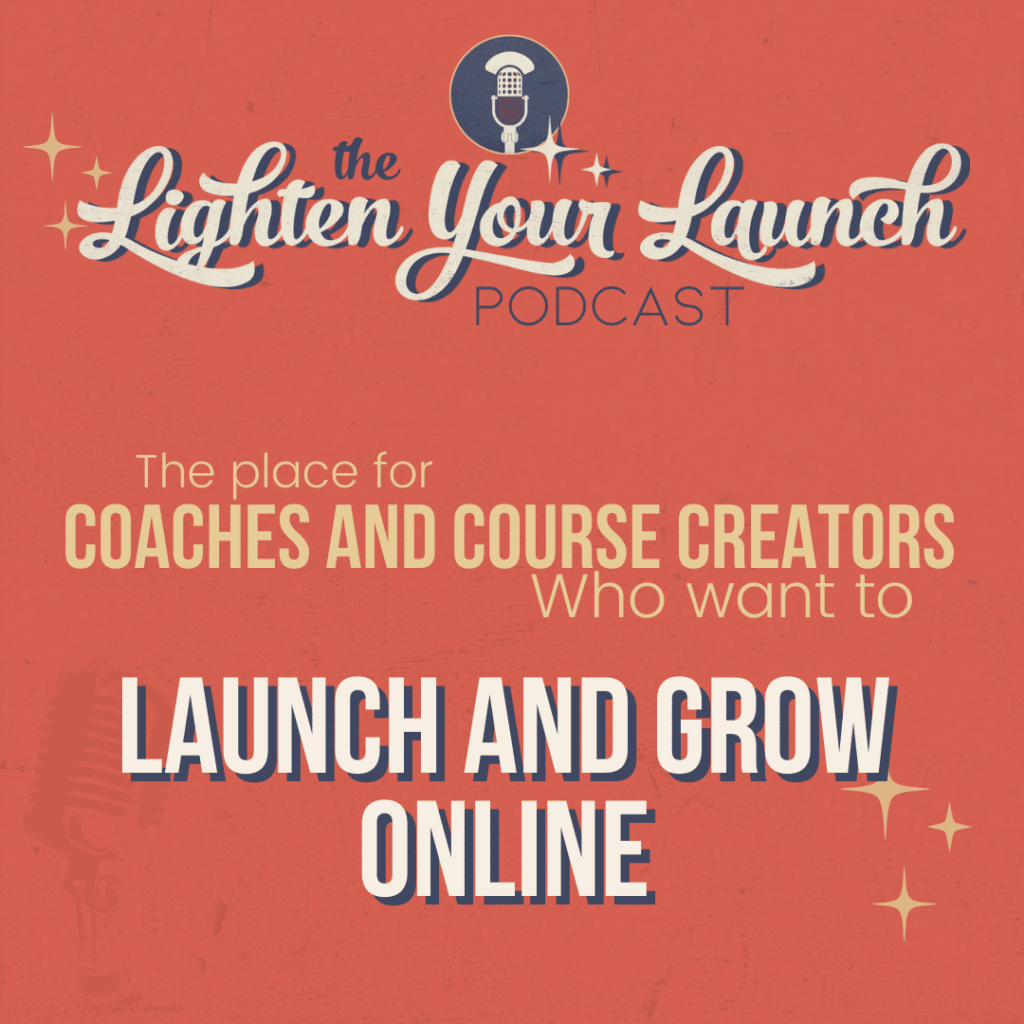
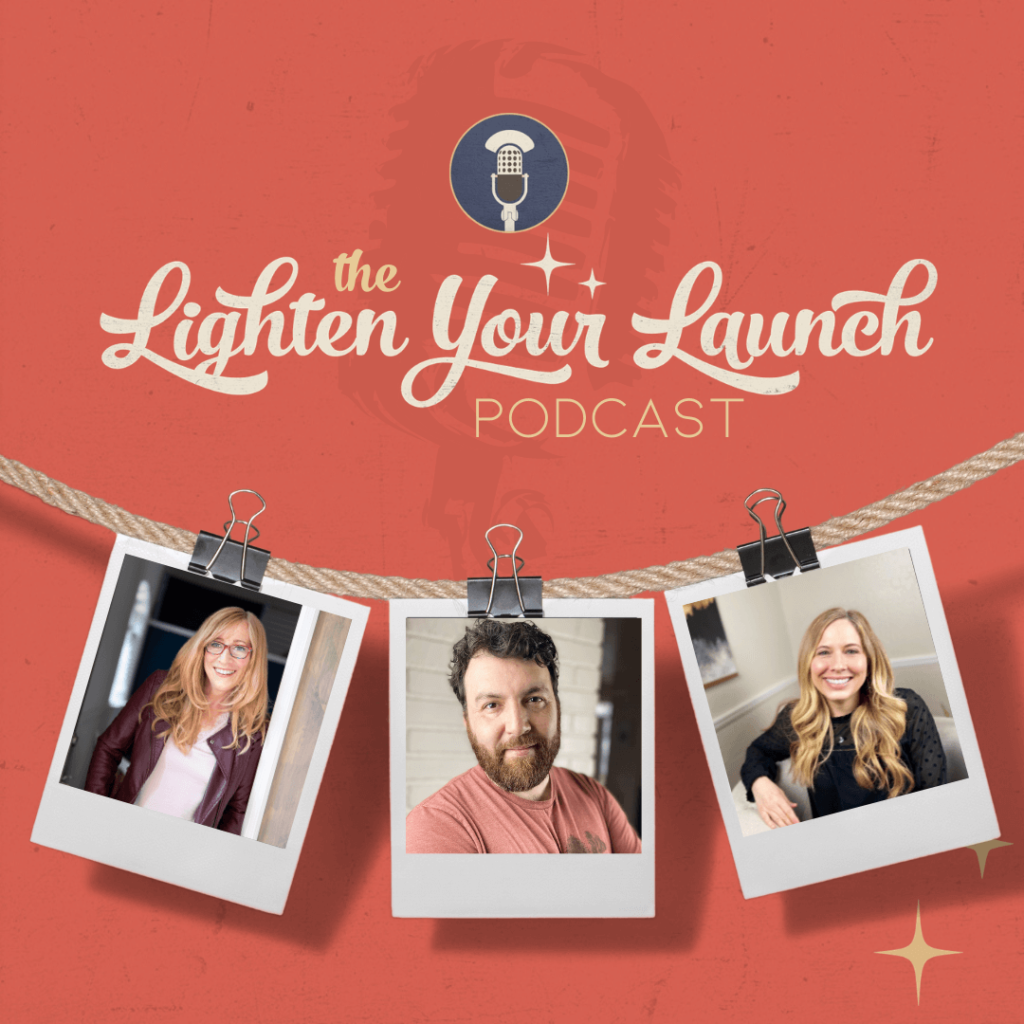


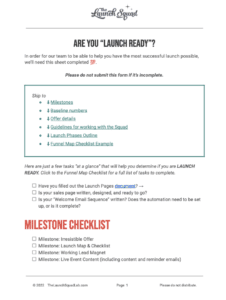
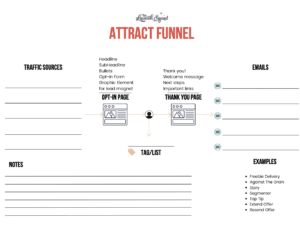
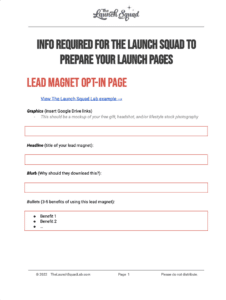
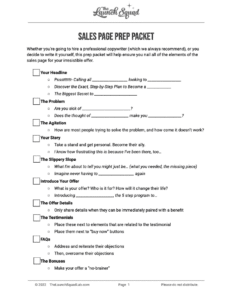
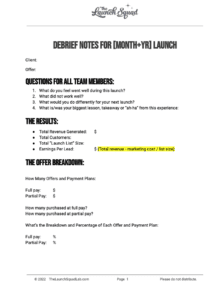
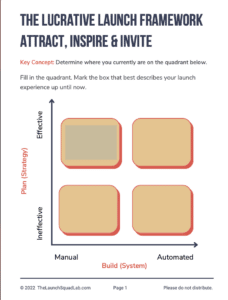
![Marketing Launch Calendar [TEMPLATE]](https://thelaunchsquadlab.com/wp-content/uploads/2023/05/Marketing-Launch-Calendar-TEMPLATE-300x260.png)
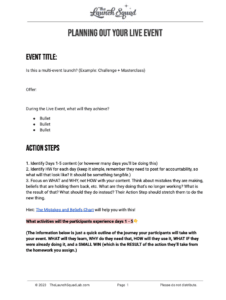
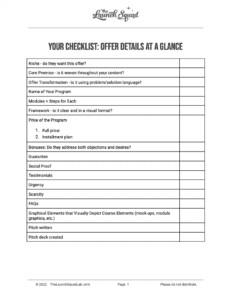
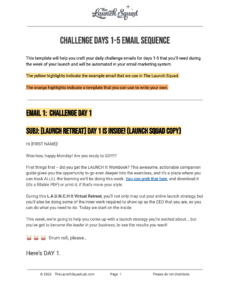
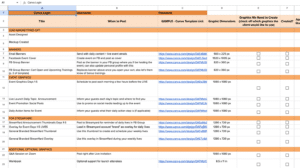
![[Updated] Email Templates for Launch](https://thelaunchsquadlab.com/wp-content/uploads/2023/05/Updated-Email-Templates-for-Launch-223x300.png)
![[REVISED] LS Pitch Script](https://thelaunchsquadlab.com/wp-content/uploads/2023/05/REVISED-LS-Pitch-Script-2023-226x300.png)

